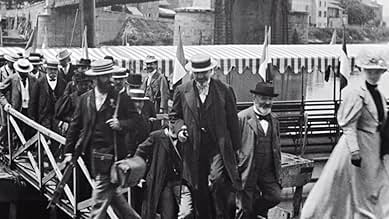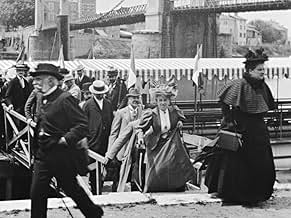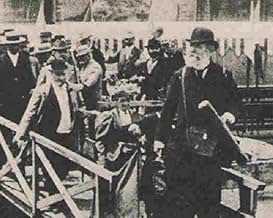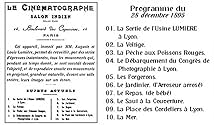IMDb रेटिंग
5.7/10
2.1 हज़ार
आपकी रेटिंग
अपनी भाषा में प्लॉट जोड़ेंThe photographers who need to participate in the congress of Lyon get off a boat in Neuville-sur-Saône, dividing to the right and left.The photographers who need to participate in the congress of Lyon get off a boat in Neuville-sur-Saône, dividing to the right and left.The photographers who need to participate in the congress of Lyon get off a boat in Neuville-sur-Saône, dividing to the right and left.
- निर्देशक
- स्टार
P.J.C. Janssen
- Self
- (बिना क्रेडिट के)
फ़ीचर्ड समीक्षाएं
I watched this film on a DVD that was rammed with short films from the period. I didn't watch all of them as the main problem with these type of things that their value is more in their historical novelty value rather than entertainment. So to watch them you do need to be put in the correct context so that you can keep this in mind and not watch it with modern eyes. With the Primitives & Pioneers DVD collection though you get nothing to help you out, literally the films are played one after the other (the main menu option is "play all") for several hours. With this it is hard to understand their relevance and as an educational tool it falls down as it leaves the viewer to fend for themselves, which I'm sure is fine for some viewers but certainly not the majority. What it means is that the DVD saves you searching the web for the films individually by putting them all in one place but that's about it.
Anyway onto this film which is as the title suggests, lots of people getting off a boat. This is essentially a rerun of the Lumière film that saw lots of people leaving a factory and it is as exciting. The only thing that did make it interesting to me was the people in question react differently from those leaving the works in the other film. Maybe it is to do with their class, or maybe they are more savvy about cameras or maybe they are just told to do this but some wave, smile etc a reaction you would get today but interesting to see it then when such a thing was very much a novelty.
Other than this point of interest though, I found the film to be what it now is a historical novelty that can only be seen as such.
Anyway onto this film which is as the title suggests, lots of people getting off a boat. This is essentially a rerun of the Lumière film that saw lots of people leaving a factory and it is as exciting. The only thing that did make it interesting to me was the people in question react differently from those leaving the works in the other film. Maybe it is to do with their class, or maybe they are more savvy about cameras or maybe they are just told to do this but some wave, smile etc a reaction you would get today but interesting to see it then when such a thing was very much a novelty.
Other than this point of interest though, I found the film to be what it now is a historical novelty that can only be seen as such.
10PCC0921
This film, along with nine other films, were shown at a Paris, mini-film festival, by pioneering filmmakers, the Lumiere brothers, in December of 1895. Most film historians place this date as the start of the film industry. The third movie ever shown to a paying audience, actually says a lot in its short 37 second runtime. The photographers disembark off of a passenger ferry in Neuville-sur-Saône, Rhône, France. Try to remember these guys aren't politicians, but photographers, assembling for a big meeting. The backdrop view of the bridge reminded me of various times in my life when I took a boat trip near a bridge that size. It created some nostalgia for me, which is the prime point of enjoying pioneering films from the silent era. Getting off a boat, feeling the waves underneath, taking in the fresh outside air, speaks volumes here. There are various restorations I found on YouTube for this film, that are really good. If you search you can find perfect versions of this movie.
I thought it was interesting seeing the photographers, tipping their hats to the film cameraman. It showed a respect between the photographers and the cinematographer himself. Being in the 21st century now and seeing it from this point of view, the first thing you think about is, a lot of these guys might lose their jobs someday to this new medium called moving pictures. They were having so much fun, assembling for their photography meeting, they didn't realize they were looking into their future, through the film camera lens of this new medium. Photography had been around for almost 60 years by this point and it begs to wonder if they felt threatened by the new technology that was looking them in the eye. The men coming off the boat created an atmosphere of foreshadowing. It was a preview of an era of innovations, that was coming to the world soon.
9.9 (A+ MyGrade) = 10 IMDB.
I thought it was interesting seeing the photographers, tipping their hats to the film cameraman. It showed a respect between the photographers and the cinematographer himself. Being in the 21st century now and seeing it from this point of view, the first thing you think about is, a lot of these guys might lose their jobs someday to this new medium called moving pictures. They were having so much fun, assembling for their photography meeting, they didn't realize they were looking into their future, through the film camera lens of this new medium. Photography had been around for almost 60 years by this point and it begs to wonder if they felt threatened by the new technology that was looking them in the eye. The men coming off the boat created an atmosphere of foreshadowing. It was a preview of an era of innovations, that was coming to the world soon.
9.9 (A+ MyGrade) = 10 IMDB.
Neuville-sur-Saône: Débarquement du congrès des photographes à Lyon (1895)
The title of this Lumiere Brothers film pretty much tells you what you're looking at. We see a group of people walking off a riverboat and coming close to the camera who catches their every move. There's certainly nothing ground-breaking about this early "actuality" movie but if you're a fan of these then you're bound to enjoy this one. I always enjoy watching these because it gives you a great chance to see how things were so many years ago. This one here features a lot of people so you get a terrific idea of the type of clothing that was worn during this period as well as a chance to see the various other things going on. This here is well worth watching if you enjoy these movies.
The title of this Lumiere Brothers film pretty much tells you what you're looking at. We see a group of people walking off a riverboat and coming close to the camera who catches their every move. There's certainly nothing ground-breaking about this early "actuality" movie but if you're a fan of these then you're bound to enjoy this one. I always enjoy watching these because it gives you a great chance to see how things were so many years ago. This one here features a lot of people so you get a terrific idea of the type of clothing that was worn during this period as well as a chance to see the various other things going on. This here is well worth watching if you enjoy these movies.
This film is a virtual remake of 'Sortie d'Usine', perhaps making it the first self-referential movie. Instead of the workers streaming out of the factory, we have fellow cinematograph specialists disembarking a liner for a congress. Instead of workers silently doing their masters' bidding, we have colleagues, friends, peers, fearlessly greeting the camera as equals.
This is a film about film - the Congressionists walk with their cameras; this film was precessed immediately for viewing at the conference. Already, the Lumieres' desire to 'objectively' record the world has turned into a naval-gazing admission of defeat, of the impossibility of objectivity untainted by subjectivity or ideology. Godard once suggested that the most honest film would be of a camera recording itself in a mirror. This film is an early grasping of what he means.
This is a film about film - the Congressionists walk with their cameras; this film was precessed immediately for viewing at the conference. Already, the Lumieres' desire to 'objectively' record the world has turned into a naval-gazing admission of defeat, of the impossibility of objectivity untainted by subjectivity or ideology. Godard once suggested that the most honest film would be of a camera recording itself in a mirror. This film is an early grasping of what he means.
Considering that the Photographical Congress arriving in Lyon was a major event, I suppose you could call this one more important than the Lumiere Brothers' previous efforts because the event is something that most people wouldn't see a lot of the time. This film captures simply what the title suggests: a whole crowd of photographers coming off a ferry. Indeed quite a few of the photographers notice the camera and while some tip their hats in greeting, others notice the camera and refuse to be part of the film by dashing off the screen quickly.
At only a minute watching, this short documentary isn't a waste of time. It will probably only be interesting to people like me who, believe it or not, somehow find entertainment in watching these things. Audiences nowadays will find it pretty uninteresting--except for if you're a historian. In that case it's a must-see.
At only a minute watching, this short documentary isn't a waste of time. It will probably only be interesting to people like me who, believe it or not, somehow find entertainment in watching these things. Audiences nowadays will find it pretty uninteresting--except for if you're a historian. In that case it's a must-see.
क्या आपको पता है
- कनेक्शनEdited into The Lumière Brothers' First Films (1996)
टॉप पसंद
रेटिंग देने के लिए साइन-इन करें और वैयक्तिकृत सुझावों के लिए वॉचलिस्ट करें
विवरण
- रिलीज़ की तारीख़
- कंट्री ऑफ़ ओरिजिन
- भाषा
- इस रूप में भी जाना जाता है
- The Photographical Congress Arrives in Lyon
- फ़िल्माने की जगहें
- उत्पादन कंपनी
- IMDbPro पर और कंपनी क्रेडिट देखें
- चलने की अवधि1 मिनट
- रंग
- ध्वनि मिश्रण
- पक्ष अनुपात
- 1.33 : 1
इस पेज में योगदान दें
किसी बदलाव का सुझाव दें या अनुपलब्ध कॉन्टेंट जोड़ें

टॉप गैप
By what name was Le débarquement du congrès de photographie à Lyon (1895) officially released in Canada in English?
जवाब




















